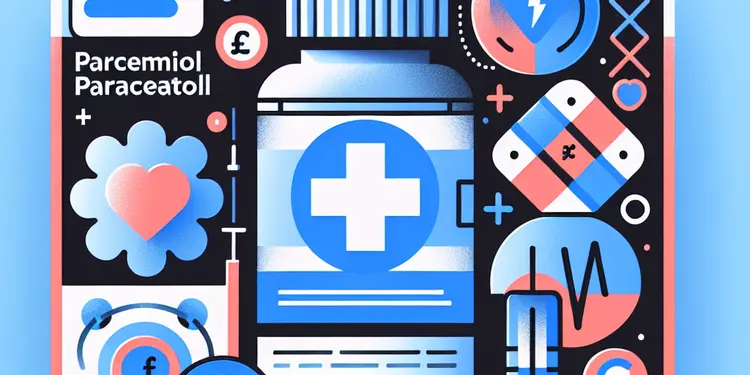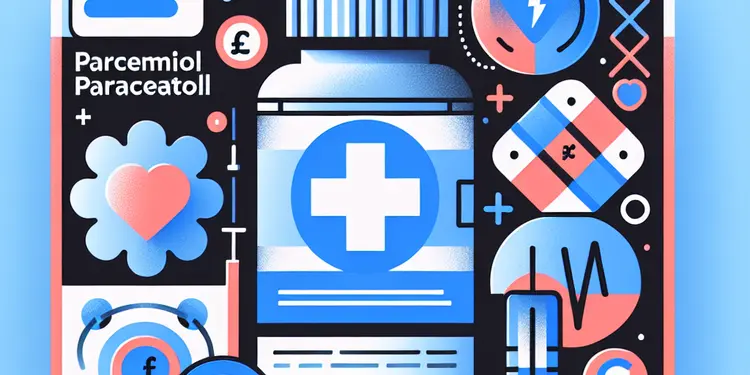
Find Help
More Items From Ergsy search
-

Is paracetamol linked to autism?
Relevance: 100%
-

Why is there concern about paracetamol and autism?
Relevance: 90%
-

Is there any scientific evidence that links paracetamol use to autism?
Relevance: 88%
-

Is there any risk of using paracetamol outside of pregnancy with regard to autism?
Relevance: 86%
-

What can cause autism, if not paracetamol?
Relevance: 80%
-

What are the limitations of studies examining paracetamol use and autism?
Relevance: 60%
-

What is Autism?
Relevance: 55%
-

Is there an autism test?
Relevance: 54%
-

Has paracetamol been linked to other developmental issues besides autism?
Relevance: 54%
-

What is Paracetamol?
Relevance: 54%
-

What is Paracetamol?
Relevance: 54%
-

Is there a genetic component to autism?
Relevance: 52%
-

What is the autism spectrum?
Relevance: 52%
-

How prevalent is autism?
Relevance: 52%
-

What causes autism?
Relevance: 52%
-

Can autism be cured?
Relevance: 52%
-

What are the signs of autism?
Relevance: 52%
-

How is autism diagnosed?
Relevance: 51%
-

Are vaccines linked to autism?
Relevance: 51%
-

Can adults have autism?
Relevance: 50%
-

Is Paracetamol the same as Aspirin?
Relevance: 50%
-

Autism: Graeme's story | NHS
Relevance: 50%
-

Autism - My Story - Rosalind | NHS
Relevance: 50%
-

Autism - My Story - Adrian | NHS
Relevance: 49%
-

Does Paracetamol reduce inflammation?
Relevance: 49%
-

Have any major health organizations advised against using paracetamol during pregnancy due to autism concerns?
Relevance: 49%
-

What is a common use of paracetamol?
Relevance: 49%
-

Is autism more common in boys or girls?
Relevance: 48%
-

What are the side effects of Paracetamol?
Relevance: 48%
-

How does autism affect communication?
Relevance: 48%
-

What are some common therapies for autism?
Relevance: 48%
-

Is it safe to take Paracetamol with Ibuprofen?
Relevance: 47%
-

Can Paracetamol be used in pregnant women?
Relevance: 47%
-

Can people with autism lead independent lives?
Relevance: 47%
-

What is the difference between autism and Asperger's syndrome?
Relevance: 46%
-

Which one is better for headaches: Aspirin or Paracetamol?
Relevance: 45%
-

Autism Assessment - What Happens in Your Appointment
Relevance: 45%
-

What role do sensory issues play in autism?
Relevance: 45%
-

Which one is better for toothache: Ibuprofen or Paracetamol?
Relevance: 45%
-

How can families support a member with autism?
Relevance: 45%
Overview of Paracetamol and its Use
Paracetamol, known as acetaminophen in some countries like the US, is a commonly used medication for pain relief and to reduce fever. It is widely available over the counter and is considered one of the safest analgesics when used at recommended doses. In the UK, it is often the go-to medication for minor aches and pains, headaches, and is safe for most people, including children and pregnant women, when used appropriately.
Concerns Linking Paracetamol to Autism
Recent discussions and studies have raised public concern about the potential link between prenatal exposure to paracetamol and the risk of developmental disorders such as autism spectrum disorder (ASD) and attention-deficit/hyperactivity disorder (ADHD) in children. The topic has gained attention as various studies have been published with differing conclusions, leading to public uncertainty and increased media coverage.
Understanding the Scientific Evidence
The concerns about paracetamol and autism stem from observational studies rather than clinical trials. Some studies suggest that prolonged use of paracetamol during pregnancy might be correlated with a higher incidence of ASD and ADHD in children. However, these studies often rely on self-reported data, which can introduce bias and are subject to confounding factors. For instance, the underlying condition requiring paracetamol—such as fever or infection—might also play an independent role in affecting neurological development.
Criticism of the Studies
Many health professionals and researchers have critiqued these studies, emphasizing the lack of rigorous scientific evidence and clear causal links. Observational studies can suggest associations but cannot definitively prove causation. Critics argue that the anxiety caused by preliminary studies might deter pregnant women from using paracetamol when it is legitimately needed, potentially leading to untreated pain or fever, which could also pose risks to maternal and fetal health.
Current Medical Guidance
In the UK, healthcare authorities like the NHS and the Medicines and Healthcare Products Regulatory Agency (MHRA) continue to recommend paracetamol as a safe option during pregnancy when used correctly. They advise that pregnant women use the lowest effective dose for the shortest duration necessary and recommend consulting healthcare professionals for proper guidance.
Conclusion
While there is ongoing research into the effects of prenatal exposure to various substances, including paracetamol, current evidence does not warrant an immediate change in medical guidelines for paracetamol use during pregnancy. It highlights the need for further research to conclusively understand the potential risks and benefits. People are encouraged to remain informed, consult healthcare providers, and avoid unnecessary worry based on preliminary data.
What is Paracetamol?
Paracetamol is a medicine that helps with pain and fever. In some places, like the US, it is called acetaminophen. You can buy it easily in shops. It is safe when you follow the rules on how much to take. In the UK, many people use it for things like small aches, pains, and headaches. It is also safe for most people, including kids and pregnant women, if used the right way.
Does Paracetamol Cause Autism?
Some people are worried that taking paracetamol when pregnant might be linked to autism or ADHD in children. This idea comes from some studies that people have talked about a lot. These studies say different things, making people unsure and causing news stories.
Looking at the Science
The worry about paracetamol and autism comes from studies that watch people rather than test on them. Some of these studies say taking paracetamol a lot during pregnancy might be linked to more autism or ADHD in kids. But these studies use information people remember, which can sometimes be wrong. Also, the reason for taking paracetamol, like fever or infection, might also affect a baby's brain development.
Why Some People Don't Agree with the Studies
Many doctors and researchers say these studies are not strong enough to prove anything for sure. They say seeing a link does not mean one thing causes the other. Some worry that these studies might scare pregnant women, stopping them from taking paracetamol when they need it, which could mean pain or fever goes untreated and could be bad for both mom and baby.
What Doctors Say Now
In the UK, groups like the NHS say paracetamol is safe during pregnancy if used properly. They advise using the smallest amount that works and only for as long as needed. Pregnant women should talk to their doctor to make sure they use paracetamol safely.
What We Know
Scientists are still studying how things like paracetamol affect unborn babies. Right now, there's no strong reason to change how paracetamol is used during pregnancy. It's important for more studies to happen so we can know for sure. For now, people should stay informed, talk to their doctors, and try not to worry too much about early study results.
Frequently Asked Questions
What is paracetamol?
Paracetamol, also known as acetaminophen, is a widely used over-the-counter medication for pain relief and fever reduction.
Why is there concern about paracetamol use during pregnancy?
Some studies suggest that paracetamol use during pregnancy may be associated with an increased risk of developmental and behavioral disorders in children, including autism.
What is autism?
Autism, or autism spectrum disorder (ASD), is a developmental disorder characterized by challenges with social interaction, communication, and repetitive behaviors.
Have studies shown a direct link between paracetamol use and autism?
While some studies have suggested a potential association, there is currently no definitive evidence proving a direct causal link between paracetamol use during pregnancy and autism in children.
Why do some studies suggest a link between paracetamol and autism?
Some studies have found statistical associations between prenatal exposure to paracetamol and an increased risk of autism, but these studies often have limitations and do not establish causation.
What are potential confounding factors in the studies about paracetamol and autism?
Potential confounding factors include underlying conditions that require paracetamol use, genetic predispositions, and environmental influences that may also contribute to autism risk.
Are there guidelines on paracetamol use for pregnant women?
Health authorities generally advise that paracetamol should be used during pregnancy only if necessary, at the lowest effective dose, and for the shortest possible duration.
What alternatives to paracetamol exist for pain relief during pregnancy?
Alternatives may include non-pharmacological options such as rest, hydration, and the use of heating pads or cold compresses. Always consult a healthcare provider before taking any medication during pregnancy.
What is the scientific community’s stance on the issue?
The scientific community recognizes the importance of further research to better understand any potential links and advises caution in interpreting current findings without definitive evidence.
How should expectant mothers approach paracetamol use?
Expectant mothers are advised to consult with their healthcare providers to assess the risks and benefits of paracetamol use and to discuss any concerns about its use during pregnancy.
Has paracetamol use been proven safe during pregnancy?
Paracetamol has been considered relatively safe for short-term use during pregnancy, but ongoing research continues to assess its safety more comprehensively.
What have researchers concluded about paracetamol and autism?
Researchers have not reached a consensus; while some findings suggest a potential risk, others do not, and further research is necessary to clarify the relationship.
How does the body's metabolism of paracetamol affect risk during pregnancy?
Differences in metabolism could theoretically influence the levels of paracetamol or its metabolites, potentially affecting fetal development, but specific mechanisms remain speculative.
What role does dosage and duration of paracetamol use play in potential risks?
Higher doses and prolonged use of paracetamol during pregnancy may increase risks, but the exact relationship between dosage, duration, and any developmental outcomes is not fully understood.
What are behavioral disorders that concern researchers in relation to paracetamol use?
In addition to autism, researchers are also investigating potential links between paracetamol use and disorders like ADHD and other neurodevelopmental issues.
Have regulatory agencies issued warnings about paracetamol use in pregnancy?
Currently, no major health regulatory agency has issued specific warnings against paracetamol use in pregnancy, but they recommend cautious use under medical guidance.
Are there any known mechanisms by which paracetamol could influence fetal development?
Hypothetical mechanisms include interference with hormonal processes or oxidative stress, though these are not definitively linked to autism.
What should researchers focus on in future studies on paracetamol and autism?
Future research should aim to account for confounding factors, investigate biological mechanisms, and use large, well-controlled cohort studies to assess potential links.
What is the general medical advice for medication use during pregnancy?
The general advice is to use medications during pregnancy only when necessary, choose those known to be safe, and follow medical guidance to minimize any potential risks.
What should individuals do if they have concerns about paracetamol use during pregnancy?
Individuals should discuss their concerns with their healthcare provider, who can offer personalized advice based on their health needs and current medical evidence.
What is paracetamol?
Paracetamol is a medicine. It can help if you have a headache or if something hurts. It is safe if you don't take too much.
Things to remember:
- Ask an adult before taking paracetamol.
- Read the label on the medicine bottle or box.
- If you are not sure, ask a doctor or pharmacist.
Helpful tools:
- Read Aloud Tools can read the text to you.
- Simpler Words help make the text easier to understand.
Paracetamol, also called acetaminophen, is a medicine you can buy without a doctor's prescription. It helps make pain go away and brings down a fever.
Why are people worried about taking paracetamol when pregnant?
Paracetamol is a medicine that helps when you have pain or a fever. But some people are worried about using it if you are going to have a baby. Here is what you might need to know: - **Ask the Doctor:** Talk to your doctor if you are pregnant and want to take paracetamol. They will tell you what is safe. - **Less is Better:** If you need paracetamol, try to take the smallest amount that helps you feel better. - **Read the Label:** Always check the medicine label to see how much you can take. - **Keep Track:** Write down when you take medicine so you don't take too much. There are also some apps and tools that can help you keep track of your medicine. They can remind you when to take it and how much to take.Some studies say that taking paracetamol when you are pregnant might be linked to a higher chance of children having learning and behavior problems, like autism.
What is autism?
Autism is a condition that affects how people understand and relate to others. It can make talking, learning, and playing hard for some people.
If you have autism, you might like to do the same things over and over. You might find loud noises or bright lights too much.
Everyone with autism is different. Some people with autism might need extra help at school or home.
Using pictures and drawing can help you understand more about autism. Talking to someone who knows about autism can also help.
Autism, or autism spectrum disorder (ASD), is a condition that affects how people grow and learn. People with autism may have trouble talking with others, making friends, and might do the same things over and over.
Do studies say that taking paracetamol can cause autism?
Some studies say there might be a link, but we don't have strong proof that taking paracetamol when you’re pregnant causes autism in babies.
Why do some studies say paracetamol might link to autism?
Some studies look at how paracetamol might be linked to autism. Autism is a condition that changes how people talk and act. But these studies do not prove that paracetamol causes autism. They only show a possible link.
If you find reading hard, here are some tools to help:
- Read with someone who can help explain.
- Use a simple dictionary for words you do not know.
- Take breaks if you start to feel tired.
Some studies show that if a pregnant woman takes paracetamol, there might be a higher chance of the baby having autism. But these studies have problems, and they don't prove that paracetamol causes autism.
What things might mix up the results in studies about paracetamol and autism?
Things that might mix up the results include:
- Health problems that mean you need to take paracetamol.
- Genes from your family that make you more likely to have certain things.
- Things around you, like where you live, that might also add to the chance of autism.
To help understand this better, you can:
- Use picture cards to explain each part.
- Break up the information into small, easy steps.
- Ask someone to help explain or read it with you.
Can pregnant women take paracetamol?
Paracetamol is a medicine that can help with pain or fever.
If you are pregnant and want to take paracetamol, ask your doctor or pharmacist first. It is important to be safe.
There are some things that can help:
- Talk to your doctor about how much paracetamol you can take.
- Use a tool like a medicine spoon to measure your dose correctly.
- Write down each time you take the medicine, so you do not take too much.
Doctors say it is safe to take paracetamol when you are pregnant, but only if you really need to. You should take the smallest amount that works, and for as short a time as possible.
What else can pregnant people take for pain instead of paracetamol?
If you are pregnant and have pain, you might want to try something other than paracetamol. Here are some options:
- Talk to Your Doctor: Always ask your doctor first. They can tell you what is safe.
- Use Warmth: A warm blanket or hot water bottle might help with sore muscles.
- Try Relaxing: Resting or doing deep breathing can help with pain.
- Gentle Exercise: Walking or stretching can sometimes make you feel better.
- Ask About Other Medicine: Your doctor might know about other medicine you can use.
Remember, always talk to a doctor first. They will help you choose what is best.
You can try different things instead of medicine. Here are some ideas:
- Take a break and rest.
- Drink lots of water.
- Use a warm cloth or a heating pad.
- Or try a cold cloth.
Make sure to talk to your doctor before you take any medicine when you are pregnant.
What do scientists think about this problem?
Scientists know it is important to learn more about any possible connections. They say we should be careful and not jump to conclusions because we don't have all the facts yet.
If reading is hard, you can ask someone to read with you. You can also use tools that read out loud or help you understand better.
How should pregnant women take paracetamol?
If you are pregnant and need to use medicine for pain or fever, paracetamol can help. Here are some tips:
- Talk to your doctor before taking paracetamol to make sure it's safe for you and your baby.
- Follow the instructions on the medicine bottle or box.
- Do not take more than the recommended dose.
- If you have questions, ask your doctor or pharmacist.
Using a calendar or set reminders can help you keep track of when to take your medicine. If you have trouble reading labels, ask someone you trust for help.
Pregnant women should talk to their doctor or nurse. They can help you decide if taking paracetamol is safe. You should share any worries you have about using paracetamol while pregnant.
Tools that can help you understand better include looking at pictures, asking the doctor to explain things in different ways, or having someone with you to help you listen.
Is paracetamol safe to take when you are pregnant?
Paracetamol is a medicine you can take for a short time when you are pregnant. Many people think it's safe, but scientists are still checking to make sure.
What do scientists say about paracetamol and autism?
Scientists study how things work. Some scientists looked at paracetamol. This is a medicine that helps when you have pain or a fever.
They wanted to know if paracetamol is linked to autism. Autism is when some children think and learn differently.
Scientists have not found clear answers yet. They are still looking and learning more.
If you have questions about medicine, talk to a doctor or someone who helps with health.
Reading tip: Use tools like text-to-speech to help you understand better.
Scientists do not all agree. Some say there might be a risk, but others do not think so. We need to do more studies to know for sure.
How does the body change paracetamol when a person is pregnant?
When a person is pregnant, the body changes (or breaks down) paracetamol differently. This can change the safety and risk for the baby.
Here are some things you can do to stay safe:
- Always talk to a doctor before taking paracetamol when pregnant.
- A doctor can tell you the right amount to take.
- Use tools like medicine measuring cups to make sure you take the right amount.
- Read medicine labels carefully with help if needed.
Our bodies work differently, and this can change how we process medicine like paracetamol. This might affect a baby growing in the womb, but scientists are still trying to understand exactly how.
How much paracetamol you take and how long you take it for: What are the risks?
Taking a lot of paracetamol when you are pregnant might be risky. We do not know exactly how much is safe or for how long it is safe to take it. It is important to talk to your doctor.
What behavior problems do researchers worry about with paracetamol use?
Scientists are studying how paracetamol might be linked to other problems like ADHD and other brain development issues.
Did health experts give warnings about using paracetamol when you're pregnant?
If you're having a baby, you might use medicine to feel better. But some medicines can harm the baby. Health experts study medicines to keep you safe. They tell us which ones are okay to use.
Paracetamol is one kind of medicine. Health experts check if paracetamol is safe for moms and babies. Sometimes, they give warnings if they find problems.
If you are pregnant and have questions, talk to your doctor. They can help you understand what medicines are safe.
You can also ask a family member or friend to help you read and understand information about medicines.
Right now, big health groups have not said paracetamol (a type of medicine) is bad for pregnant people. But they say to be careful and talk to a doctor first.
Can paracetamol affect how a baby grows before it is born?
Paracetamol is a medicine that some people take to feel better. We don't know everything about how it might affect a baby growing inside a mom. If you are worried, you can talk to a doctor or a nurse to learn more. They can help answer questions.
To learn more, you can use picture guides or ask someone to read with you.
Some ways this might happen could include messing with hormones in the body or causing something called oxidative stress. But we don't know for sure if these things cause autism.
What should researchers look at in future studies about paracetamol and autism?
Researchers should think about what paracetamol does in the body. They can look at how it might be linked to autism.
They should watch how paracetamol affects children during pregnancy. This means when a baby is growing inside the mother.
Researchers can use simple tools. For example, they can ask questions to parents or watch how children grow and change.
Using pictures and easy words can help make the study clearer for everyone.
Future research should try to understand other things that might change the results. It should also look at how the body works and use big, careful studies to see if there are any connections.
What should you know about taking medicine when you are pregnant?
When you are pregnant, only take medicine if you really need it. Choose medicine that is known to be safe. Always listen to your doctor to make sure you and your baby stay healthy.
What to Do If You're Worried About Taking Paracetamol During Pregnancy
If you are pregnant and worried about taking paracetamol, talk to a doctor or nurse. They can give you advice.
Here are some things you can do:
- Ask a doctor or nurse for help. They can tell you if it's safe to take paracetamol.
- Write down any questions you have before you see the doctor. This can help you remember everything you want to ask.
- Use pictures or drawings to help understand what the doctor says. You can ask the doctor to explain using simple words.
It is important to talk to a doctor about any worries you have.
Talk to your doctor or nurse if you have worries. They can give you advice that is just right for you. They know what is best for you and your health.
Useful Links
Have you found an error, or do you have a link or some information you would like to share? Please let us know using the form below.
-->
This website offers general information and is not a substitute for professional advice.
Always seek guidance from qualified professionals.
If you have any medical concerns or need urgent help, contact a healthcare professional or emergency services immediately.
Some of this content was generated with AI assistance. We’ve done our best to keep it accurate, helpful, and human-friendly.
- Ergsy carfully checks the information in the videos we provide here.
- Videos shown by Youtube after a video has completed, have NOT been reviewed by ERGSY.
- To view, click the arrow in centre of video.
- Most of the videos you find here will have subtitles and/or closed captions available.
- You may need to turn these on, and choose your preferred language.
- Go to the video you'd like to watch.
- If closed captions (CC) are available, settings will be visible on the bottom right of the video player.
- To turn on Captions, click settings .
- To turn off Captions, click settings again.
More Items From Ergsy search
-

Is paracetamol linked to autism?
Relevance: 100%
-

Why is there concern about paracetamol and autism?
Relevance: 90%
-

Is there any scientific evidence that links paracetamol use to autism?
Relevance: 88%
-

Is there any risk of using paracetamol outside of pregnancy with regard to autism?
Relevance: 86%
-

What can cause autism, if not paracetamol?
Relevance: 80%
-

What are the limitations of studies examining paracetamol use and autism?
Relevance: 60%
-

What is Autism?
Relevance: 55%
-

Is there an autism test?
Relevance: 54%
-

Has paracetamol been linked to other developmental issues besides autism?
Relevance: 54%
-

What is Paracetamol?
Relevance: 54%
-

What is Paracetamol?
Relevance: 54%
-

Is there a genetic component to autism?
Relevance: 52%
-

What is the autism spectrum?
Relevance: 52%
-

How prevalent is autism?
Relevance: 52%
-

What causes autism?
Relevance: 52%
-

Can autism be cured?
Relevance: 52%
-

What are the signs of autism?
Relevance: 52%
-

How is autism diagnosed?
Relevance: 51%
-

Are vaccines linked to autism?
Relevance: 51%
-

Can adults have autism?
Relevance: 50%
-

Is Paracetamol the same as Aspirin?
Relevance: 50%
-

Autism: Graeme's story | NHS
Relevance: 50%
-

Autism - My Story - Rosalind | NHS
Relevance: 50%
-

Autism - My Story - Adrian | NHS
Relevance: 49%
-

Does Paracetamol reduce inflammation?
Relevance: 49%
-

Have any major health organizations advised against using paracetamol during pregnancy due to autism concerns?
Relevance: 49%
-

What is a common use of paracetamol?
Relevance: 49%
-

Is autism more common in boys or girls?
Relevance: 48%
-

What are the side effects of Paracetamol?
Relevance: 48%
-

How does autism affect communication?
Relevance: 48%
-

What are some common therapies for autism?
Relevance: 48%
-

Is it safe to take Paracetamol with Ibuprofen?
Relevance: 47%
-

Can Paracetamol be used in pregnant women?
Relevance: 47%
-

Can people with autism lead independent lives?
Relevance: 47%
-

What is the difference between autism and Asperger's syndrome?
Relevance: 46%
-

Which one is better for headaches: Aspirin or Paracetamol?
Relevance: 45%
-

Autism Assessment - What Happens in Your Appointment
Relevance: 45%
-

What role do sensory issues play in autism?
Relevance: 45%
-

Which one is better for toothache: Ibuprofen or Paracetamol?
Relevance: 45%
-

How can families support a member with autism?
Relevance: 45%


